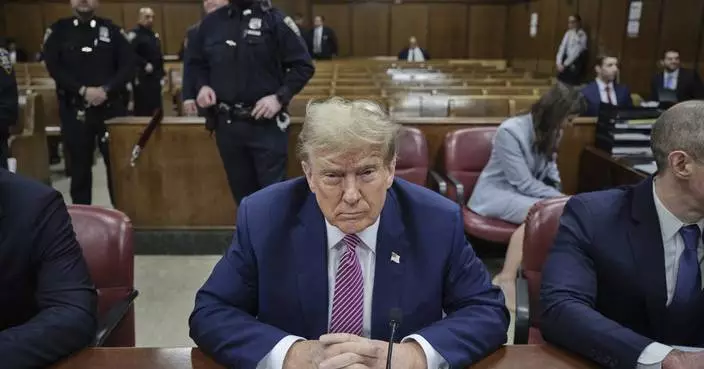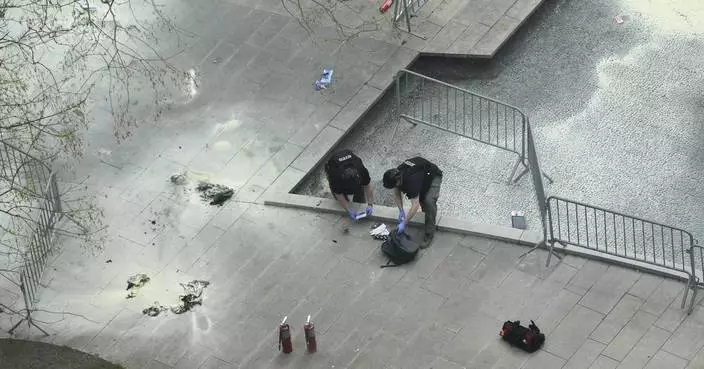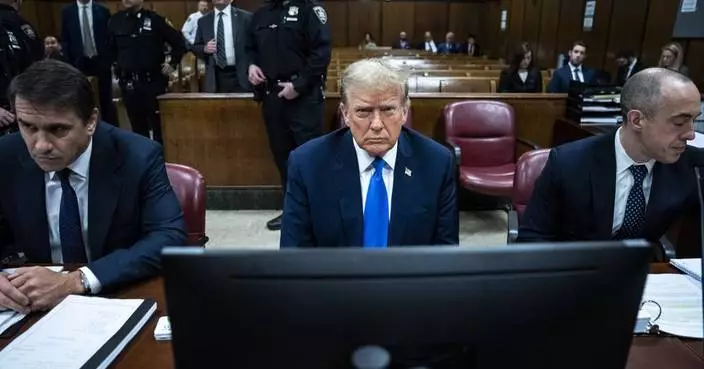President Donald Trump would like to freeze the moment. He had relished watching a fractious Democratic debate. He had soaked in affirmation at a rally. And he was spending the night at one of his hotels, on the Las Vegas Strip.
Trump, making a rare four-day swing through the West, was exuding reelection confidence Thursday after the prior night's prize fight of a debate in Las Vegas. He reveled in the intra-party squabbling and the weak debut debate performance turned in by former New York City Mayor Mike Bloomberg, according to aides and allies.
When Trump woke up Thursday morning in his gilded Las Vegas hotel, his base during the four-state western trip, he tuned in to the post-debate coverage and displayed his glee.
Repurposing one of Bloomberg's own quotes about the Democratic infighting, Trump tweeted: “The real winner last night was Donald Trump.” He tacked on his own coda: “I agree!”
The night before, after his own campaign rally in Phoenix, Trump summoned reporters to his office aboard Air Force One to join him in watching a replay of the debate on the return flight to Las Vegas. His motorcade jammed up traffic for more than a half hour as it passed the casino that had hosted the Democrats' debate in the lead-up to the party caucuses in Nevada on Saturday.
Trump was holding his third campaign rally in three days later Thursday in Colorado Springs. But his preoccupation with the scrambled nomination race for the Democrats seeking to replace him has been clear throughout the trip.
Bloomberg has been the most disconcerting force in the 2020 race for Trump since the ultra-billionaire entered the fray in November and spent more than $400 million, which rocketed him in the polls in just three months.
Trump's campaign poll numbers have improved since his impeachment trial wrapped up in January and his campaign has broken fundraising records, raising $60 million in January and $14 million this week in California alone. But Bloomberg's willingness to spend near-unlimited sums to defeat Trump this fall, and the mocking tone of many of his ads, have deeply rankled the president.
Trump's campaign had organized itself around the strategy that it would be able to paint any rival as an extreme liberal, a "socialist" or worse, and concerns mounted that strategists would have to come up with a different plan should Bloomberg win the nomination.
Trump's team saw the debate as validating his reelection strategy and providing a fresh opening for Vermont Sen. Bernie Sanders, a self-described Democratic socialist, to gain a significant delegate lead on Super Tuesday. The president was hopeful that panic from more moderate Democrats at Sanders' rise would only further fracture the Democratic Party.
“We don't care who the hell it is,” Trump boasted Wednesday. "We're going to win.”
Trump on Thursday placed a round of calls to confidants, echoing the thoughts he had posted on Twitter — at times with more colorful language — and opining that Bloomberg did not appear ready for the moment, according to two Republicans close to the White House who spoke on condition of anonymity because they were not authorized to speak publicly about private conversations.
Long insecure about Bloomberg’s wealth, Trump told confidants that the debate proved money alone did not lead to his own electoral success.
His eldest son echoed the thought as he tweeted during the debate.
“Like a deer in the headlights! Like I said last week Mini, you can’t buy personality or wit and the whole world just saw it,” Donald Trump Jr. wrote.
Between three rallies and a pair of high-dollar fundraisers, Trump sought to use his western swing to highlight administration policies that delivered on campaign promises and appealed to key demographics.
On Wednesday, he ceremoniously signed new environmental regulations that eased water restrictions on farmers in the heavily Republican California Central Valley. On Thursday, Trump spoke to a graduating class of ex-prisoners in a renewed appeal to communities of color, as he championed his administration’s work on criminal justice reform.
"Your future does not have to be defined by the mistakes of your past,” Trump told the graduates, before turning to political topics.
Trump received updates on the debate's opening minutes Wednesday evening moments before he took the stage at a rally in a packed Phoenix arena and promptly delivered his first review.
“I hear he's getting pounded tonight — you know he's in a debate,” Trump said about the man he has dubbed “Mini Mike” because of his short stature. “I hear that pounding. He spent $500 million so far and I think he has 15 points. Crazy Bernie was at 30."
WASHINGTON (AP) — After its midnight deadline, the Senate voted early Saturday to reauthorize a key U.S. surveillance law after divisions over whether the FBI should be restricted from using the program to search for Americans’ data nearly forced the statute to lapse.
The legislation approved 60-34 with bipartisan support would extend for two years the program known as Section 702 of the Foreign Intelligence Surveillance Act. It now goes to President Joe Biden’s desk to become law. White House national security adviser Jake Sullivan said Biden "will swiftly sign the bill."
“In the nick of time, we are reauthorizing FISA right before it expires at midnight,” Senate Majority Leader Chuck Schumer said when voting on final passage began 15 minutes before the deadline. “All day long, we persisted and we persisted in trying to reach a breakthrough and in the end, we have succeeded.”
U.S. officials have said the surveillance tool, first authorized in 2008 and renewed several times since then, is crucial in disrupting terror attacks, cyber intrusions, and foreign espionage and has also produced intelligence that the U.S. has relied on for specific operations, such as the 2022 killing of al-Qaida leader Ayman al-Zawahri.
“If you miss a key piece of intelligence, you may miss some event overseas or put troops in harm’s way," Sen. Marco Rubio, the top Republican on the Senate Intelligence Committee, said. "You may miss a plot to harm the country here, domestically, or somewhere else. So in this particular case, there’s real-life implications.”
The proposal would renew the program, which permits the U.S. government to collect without a warrant the communications of non-Americans located outside the country to gather foreign intelligence. The reauthorization faced a long and bumpy road to final passage Friday after months of clashes between privacy advocates and national security hawks pushed consideration of the legislation to the brink of expiration.
Though the spy program was technically set to expire at midnight, the Biden administration had said it expected its authority to collect intelligence to remain operational for at least another year, thanks to an opinion earlier this month from the Foreign Intelligence Surveillance Court, which receives surveillance applications.
Still, officials had said that court approval shouldn’t be a substitute for congressional authorization, especially since communications companies could cease cooperation with the government if the program is allowed to lapse.
House before the law was set to expire, U.S. officials were already scrambling after two major U.S. communication providers said they would stop complying with orders through the surveillance program, according to a person familiar with the matter, who spoke on the condition of anonymity to discuss private negotiations.
Attorney General Merrick Garland praised the reauthorization and reiterated how “indispensable” the tool is to the Justice Department.
“This reauthorization of Section 702 gives the United States the authority to continue to collect foreign intelligence information about non-U.S. persons located outside the United States, while at the same time codifying important reforms the Justice Department has adopted to ensure the protection of Americans’ privacy and civil liberties," Garland said in a statement Saturday.
But despite the Biden administration's urging and classified briefings to senators this week on the crucial role they say the spy program plays in protecting national security, a group of progressive and conservative lawmakers who were agitating for further changes had refused to accept the version of the bill the House sent over last week.
The lawmakers had demanded that Majority Leader Chuck Schumer allow votes on amendments to the legislation that would seek to address what they see as civil liberty loopholes in the bill. In the end, Schumer was able to cut a deal that would allow critics to receive floor votes on their amendments in exchange for speeding up the process for passage.
The six amendments ultimately failed to garner the necessary support on the floor to be included in the final passage.
One of the major changes detractors had proposed centered around restricting the FBI’s access to information about Americans through the program. Though the surveillance tool only targets non-Americans in other countries, it also collects communications of Americans when they are in contact with those targeted foreigners. Sen. Dick Durbin, the No. 2 Democrat in the chamber, had been pushing a proposal that would require U.S. officials to get a warrant before accessing American communications.
“If the government wants to spy on my private communications or the private communications of any American, they should be required to get approval from a judge, just as our Founding Fathers intended in writing the Constitution,” Durbin said.
In the past year, U.S. officials have revealed a series of abuses and mistakes by FBI analysts in improperly querying the intelligence repository for information about Americans or others in the U.S., including a member of Congress and participants in the racial justice protests of 2020 and the Jan. 6, 2021, riot at the U.S. Capitol.
But members on both the House and Senate intelligence committees as well as the Justice Department warned requiring a warrant would severely handicap officials from quickly responding to imminent national security threats.
“I think that is a risk that we cannot afford to take with the vast array of challenges our nation faces around the world,” Democratic Sen. Mark Warner, chair of the Senate Intelligence Committee, said Friday.
__
Associated Press writers Eric Tucker contributed to this report.
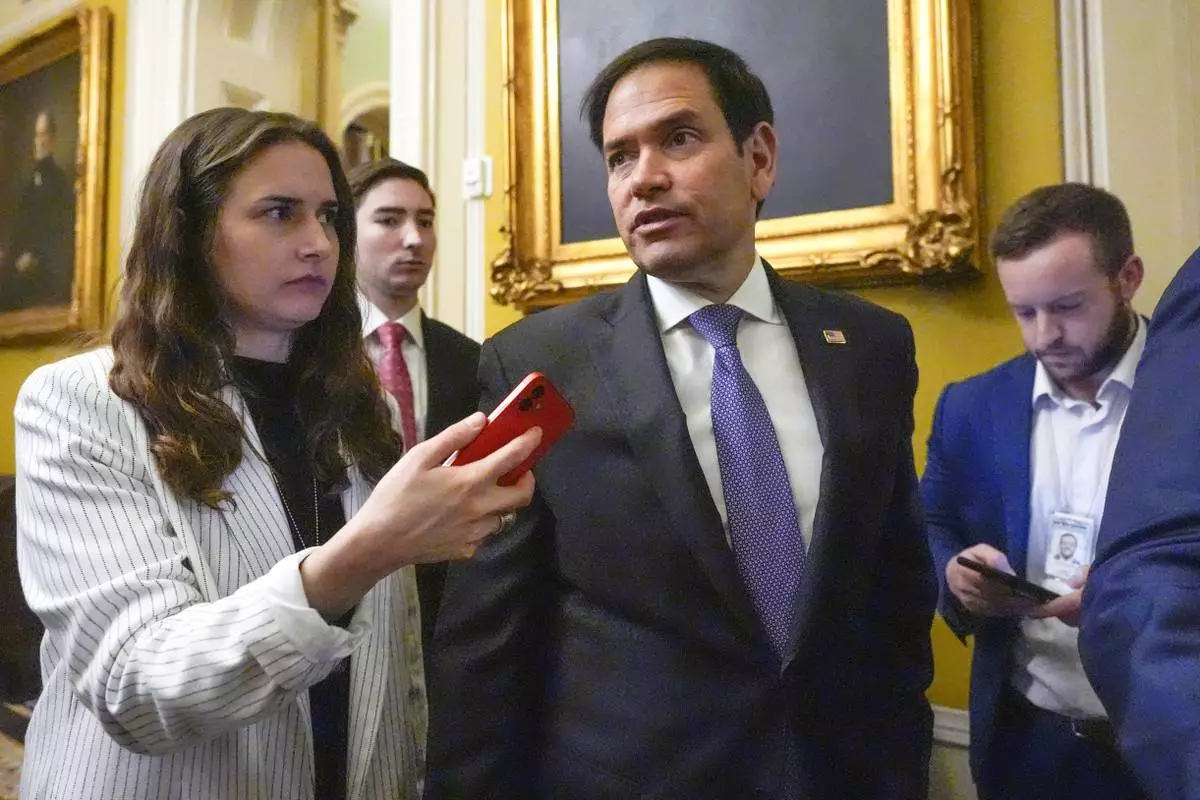
FILE - Sen. Marco Rubio, R-Fla., speaks with reporters as he walks, Feb. 28, 2024, at the Capitol in Washington. The Senate has advanced legislation that would reauthorize a key U.S. surveillance tool as lawmakers and the Biden administration rushed to tamp down fresh concerns about the program violating Americans' civil liberties. (AP Photo/Mark Schiefelbein, File)
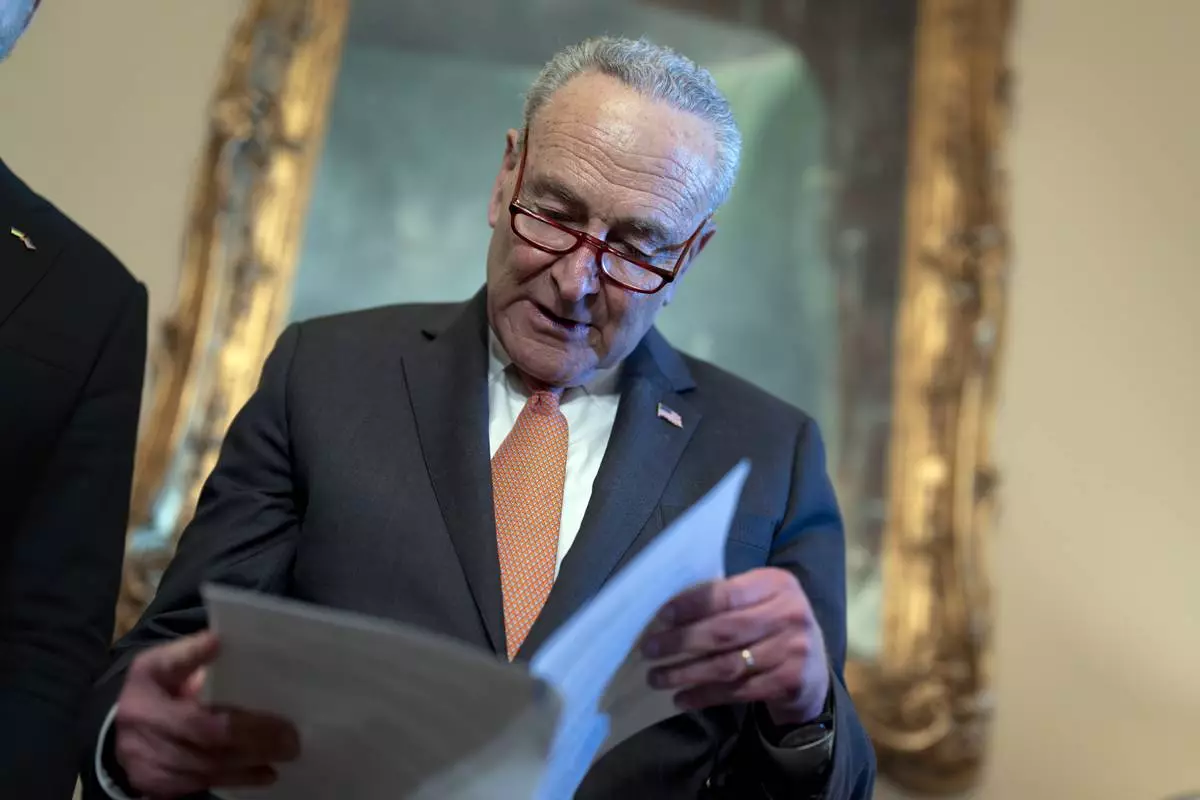
Senate Majority Leader Chuck Schumer, D-N.Y., looks over his notes during a meeting with Ukraine's Prime Minister Denys Shmyhal as Congress moves to advance an emergency foreign aid package for Israel, Ukraine and Taiwan, at the Capitol in Washington, Thursday, April 18, 2024. (AP Photo/J. Scott Applewhite)





